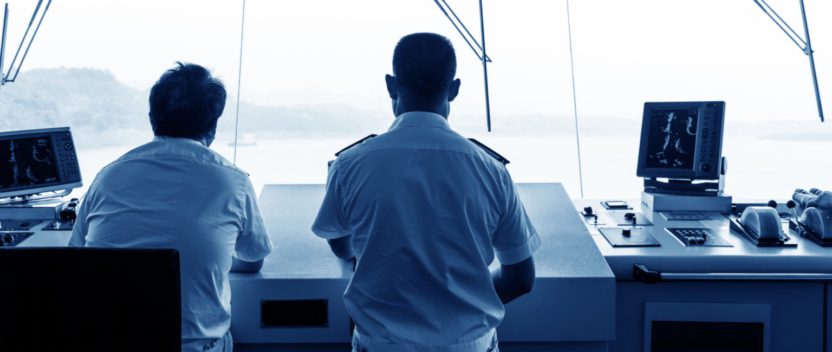Bigger data, better technology, less ballast
A month of disappointment for some as the IMO’s member states failed to ratify the Ballast Water Convention and the EU moved ahead with MRV, but elsewhere the story was growth: more ships, more data, more options, better compliance. But there was a further setback for Inmarsat in its plans for its next generation communications platform.
Tracking vessel data trends
AIS vessel tracking company MarineTraffic has released shipping density maps detailing global vessel movements over 2013 and 2014, using data compiled from billions of vessel positions.
The 2014 map, based on data consisting of over three billion vessel positions, showed that over 200,000 different routes were sailed last year. The company said comparing data from both years highlighted some trends, such as ships once again travelling close to the Somalia coast, and increased traffic from east coast South America to Asia.
The company uses data from its network of 2,000 AIS receiving stations in 165 countries around the world, as well as data from AIS satellite network partner Orbcomm. The company plans to release a six-month density map using data from the first half of 2015, which it predicts will show the effects of the new lower sulphur emissions control that came into force in Europe on January 1.
No clarity on ballast water
Despite positive signals from several states that they are preparing ratification instruments for the Ballast Water Management (BWM) Convention, the conclusion of 68th session of the International Maritime Organization’s Marine Environment Protection Committee left shipowners and system vendors with no firmer timeline on when the Convention will come into force.
It also became clear during the committee meeting held in May that the decision to revise the G8 Guidelines addressing approval of ballast water management systems, while important to the Convention’s future, will be a lengthy process covering many different issues.
A ‘Roadmap for the implementation of the BWM Convention’ was agreed, which emphasised that early movers who install BWMS approved in accordance with the current Guidelines (G8), should not be penalised. The roadmap invited the committee to develop guidance on contingency measures and to expand the trial period associated with the Guidance on ballast water sampling and analysis into an experience-building phase.
Inmarsat GX launch on hold
The saga of the launch programme for Inmarsat’s new Global Xpress satellite service opened another chapter with the news that the final satellite will be delayed following the failure of the preceding launch at the Baikonur Cosmodrome in Kazakhstan.
The satellite is the third and final in the GX constellation and arrived at the launch site at the start of May. Following the failure of the Proton rocket carrying Mexico’s Centenario mobile communications satellite, with the loss of the satellite and rocket, Inmarsat announced an indefinite delay to the launch of the satellite.
This is the third time the Global Xpress programme has suffered launch delays because of Proton launch failures and although in the past, Proton has returned to flight within a few months of a launch failure, Inmarsat said it did not know the length of the delay to the launch until the cause of the Centenario failure was established.
eLoran has chance to shine
GPS ‘back-up’ eLoran is being trialled by shipmanager EuroShip on its ships operating off the coast of the UK, where the updated system went live in 2014. Based on longwave radio signals 1m times more powerful than GPS, eLoran will be used to take over provision of position, navigation and timing data during ‘simulated’ GPS outages.
Developed by the UK’s General Lighthouse Authorities eLoran is currently the only viable backup to GPS, which is highly susceptible to interference and malicious jamming.
Frank Davies, managing director at EuroShip told DigitalShip EuroShip is looking at eLoran as a preventative measure, to avoid its vessels being vulnerable to GPS outage. “To have a backup such as eLoran would be a huge advantage as it wouldn’t disrupt the signal to the equipment at all, so we could just carry on safely. If the trials prove successful, and eLoran runs as we expect it to, we will consider rolling receivers out to our entire fleet of sixteen managed vessels as a safeguard.”
The UK is the first to deploy the upgraded technology with seven land-based monitoring stations, from Dover to Aberdeen serving the east coast. Full operational capability covering all major UK ports is expected by 2019.
Crew call for connectivity
Maritime social media network Crewtoo has published a ‘happiness’ survey of seafarers which it says highlights the importance of internet access onboard ship, claiming many demand rather than simply desire it.
Crewtoo, which is owned by maritime satellite provider KVH surveyed 687 respondents from over 50 countries, looking at 10 different factors influencing job satisfaction, including pay, food, training, shore leave and workload.
In response to the question ‘How happy are you about the contact you are able to have with your family when you are at sea?’ the average score was 6.76, the second highest score across all the topics.
According to the report, there were a number of respondents who “felt strongly enough about the issue of seafarer internet access that they suggested the need for legislation, urging the International Maritime Organisation to ensure that every vessel and every seafarer should have access.”
The report said seafarers were ‘willing to leave jobs or to refuse to join vessels where internet access or calls are not provided’ and that the MLC – which does not mandate crew calling – is having a positive impact on connectivity at sea.
Rolls-Royce renews research commitment
Rolls-Royce, the Norwegian University of Science and Technology (NTNU) and the Marintek Research Centre have renewed their research partnership into high-tech solutions aimed at improving ship performance in rough seas.
The initial agreement was signed 10 years ago following a model Rolls-Royce has developed with universities worldwide, creating a new research centre in Norway called the Rolls-Royce University Technology Centre. Rolls-Royce says the Trondheim-based centre, is the only one of its kind in Norway. Rolls-Royce meets 25-40% of the centre’s funding requirement, while the partnership also receives substantial support from the Research Council of Norway.
Technology lifts Liberia
Flag State the Liberian Registry has developed a satellite-based Compliance Assistance Programme (CAP), which its claims has helped ensure regulatory compliance and prevent detentions in some of the world’s most active Port State Control authorities.
The CAP tracks ships when they enter selected jurisdictions and allows the registry’s risk analysis team to perform detailed reviews of vessels, their history, and the ports at which they are calling. As a result, Liberian vessels have experienced a decrease in detentions in some of the world’s busiest shipping regions.
As a result, Liberia says it has been named as the best-performing major ship registry in the last three years, when it has been included on all port state White Lists and has been included in the US Qualship 21 programme.
Shipping disappointed as MRV moves ahead
The roundtable of shipping organisations has expressed its disappointment at the European Parliament’s recent adoption of Monitoring, Reporting and Verification (MRV) of individual ship emissions of CO2 at European Union ports.
The ICS, BIMCO and Intercargo expressed ‘disappointment rather than surprise’ by the Parliament’s confirmation of the EU decision to pre-empt the IMO process which will see a global data collection system on shipping’s CO2 emissions.
Despite slow progress at IMO, the organisations say the process was continuing. But there the group sees danger that the EU initiative will be seen by non-EU nations as an attempt to present them with a fait accompli, since the requirement also applies to non-EU flag ships trading to Europe.
The shipping industry associations reiterated that the latest IMO Green House Gas Study, published in 2014, found that international shipping had reduced its total CO2 emissions by more than 10% between 2007 and 2012, despite an increase in maritime trade.
Ends


